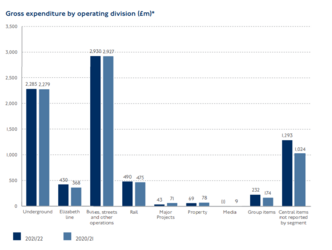e.g., if gas taxes + whatever covers the cost of maintaining the USA road network (or the freeway network or whatever), then it could be argued to be "profitable" - but there aren't really direct use costs associated with the freeways (hence "free").
The federal government doesn't give a cent to highways that didn't come from user fees like gas taxes, with the only exception being transfer payments to reimburse the Highway Trust Fund for diversions to fund transit.
State taxes are more complicated as they all have their own way of funding things and some states use gas tax money for non-road related things.
Texas for example diverts a large percentage of the gas tax to education but makes up for the shortfall by taxing oil refining and with toll roads.
Many other states have laws passed that say that gas tax money can only be spent on roads, though that provision is often weak because several blue states with those restrictions have diverted large amounts of gas tax money to fund bus lanes/BRT and bike lanes (because they're "roads").
Local roads are typically funded by property taxes, but you need roads anyways no matter what form of transportation is used. Contrary to popular urbanist belief, suburbs are usually their own cities and fund their own local infrastructure, so if the 99% of the taxpaying population in a suburb owns a car, then the taxes to fund "sprawl" are paid for by car owners, not by bughive dwellers in the nearby dense city. In many newer suburbs developers hand off the local infrastructure to HOAs and the city only pays for arterials, which makes the user-pays thing more obvious.
but passenger rail is often sold on fairbox recovery, which is always a complete fucking joke, there are few rail systems that get to 100% (mostly in asia, but apparently the London Underground also slaps). Amusingly according to wickedpedo Amtrak gets to 95% lol.
Even NYC requires massive transfer payments from state taxpayers, out-of-state commuters using the bridges and tunnels, and the federal government. The farebox recovery ratio (which only includes operating, not capital costs) for most transit systems is <30%, which is worse than any road system anywhere in the country. Somehow subsidizing transit an enormous amount is good yet a small amount of general taxes topping up gas taxes, tolls, and other user fees is abhorrent.
The Japanese rail systems are profitable because they are the landlord for half the country, not because of their trains.
The London Underground numbers are complete lies:

 Source
Source
Note that the Underground has £1.5 billion of fare revenue but £2.2 billion of expenses. They also have ~£680 million of income from Road user charging (i.e. congestion/low emission zones) and £400 million from "Other Income" (i.e general tax money). In the UK the amount of money collected from petrol tax is several times higher than the total amount spent on roads in the entire country and much of that money is diverted to transit organizations.
The numbers in the expenditure may include some capital costs, and the document says that the Underground spent £300 million on capital expenses, but that's still less money than the difference between expenses and income.
What really pisses me off about urbanists is how smug they are. They constantly claim that they're subsidizing suburban residents and drivers, when in reality it's the other way around. This is clear from looking at the actual numbers, which the YouTubers they parrot never do as they prefer to operate in hypothetical land. Urbanists are often communists who are in favor of subsidizing literally everything, but they magically become total ancaps when it comes to road funding. There's a reason why Strong Towns has never been able to cite a suburban city that has gone bankrupt due to the cost of infrastructure, and it's not for a lack of trying. Education alone dwarfs the infrastructure budgets of most suburbs.















